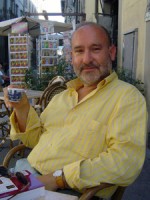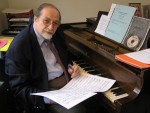Title
The New Juilliard Ensemble got off to a flying start in July as current members and alumni performed two concerts in the Summergarden festival at MoMA. Once again the overarching theme was New Music for New York—compositions never before heard in this city. On July 11, a 10-member group conducted by this writer presented four pieces completed in 2008. Two of them, receiving premieres, coincidentally have connections to Switzerland though nothing otherwise in common. American composer Laurie Altman’s Ways of Looking: At Zurich was inspired by the inexplicable experience of hearing, in his mind, the Stephen Foster song “Swanee River” while he was exploring Zurich. Swiss composer Michèle Rusconi’s Entgiftung—Alat (GPT) 57 U/1, on the other hand, was inspired by a malfunction of her liver caused by an infuriating experience in her personal life. The first word of its odd title translates as “purification”; the remainder is a medical measure of liver chemistry. Her piece is a battle between rage—represented by dynamic percussion writing—and its resolution. In this case, rage wins out. The other two pieces on the program were New York premieres of American composer Reynold Tharp’s San Francisco Night, a memorial to Ligeti inspired by the nocturnal fog in San Francisco Bay, and Venezuelan Paul Desenne’sNumber Nine, an dynamic, bouncy exploration of nine-beat measures rooted in Afro-Venezuelan music.
Body
The July 25 concert comprised four pieces in various combinations of string quartet with piano, opening with the premieres of New Yorker Eleanor Cory’s third String Quartet (2009) and David Snow’s entertaining Nice Girls Don’t (2002), for piano trio and a seemingly irrational sequence of recorded sounds. (David Snow is known to many Juilliard students, though perhaps not by name. He can normally be found in the Juilliard library, at the reference librarian’s desk next to the staircase, sporting a neatly-trimmed beard.) The second half of the program comprised New York premieres of American composer Laura Elise Schwendinger’s 2009 Piano Quartet Song for Andrew, a memorial to California composer Andrew Imbrie, and the Western Hemisphere premiere of Music for Tigers (2006) for piano quintet, by the Belizean-British composer-performer Errollyn Wallen.
Major news is the launch of a collaboration between New Juilliard Ensemble and Q2, the Internet broadcasting unit of radio station WQXR. Those who despair about the future of classical music broadcasting will be amazed by the breadth of Q2’s repertory, a huge contrast to the generally traditional programming of its parent. Highlights from the New Juilliard Ensemble and Focus! festival past seasons will air on Q2 on Sunday, September 5, at 2 p.m., for about two hours. Repeat Webcasts will take place the following Tuesday at 8 p.m. and Thursday at 4 p.m. The program will be hosted by a New Juilliard Ensemble alumna, violist Nadia Sirota. Bravo to Q2 for spreading the news that composition is alive and extremely well.
I am often asked if pieces composed for N.J.E. have any shelf life. It is exciting to announce that two performances from the April 29 concert, of pieces by alumni Paul Chihara and Martin Matalon, will be released on CDs. Furthermore, a lot of attention has been paid already to a third work from that concert: the Violin Concerto by D.M.A. composer-violinist David Fulmer for N.J.E., premiered with Fulmer as soloist in the ensemble’s April 2010 concert. Fulmer has been invited to perform and record it with the BBC Scottish Symphony Orchestra under Matthias Pintscher for the Hear and Now program on BBC Radio 3, for broadcast in February 2011. He also reports that the Norwegian violinist Ole Bohn (for whom Elliott Carter wrote his Violin Concerto) traveled from Sydney, Australia, just to attend the N.J.E. performance and commissioned Fulmer to write a new work for his concert series at Norway’s National Gallery. The Violin Concerto also brought Fulmer an invitation to be a fellow at this year’s summer Composers Conference at Wellesley College (directed by Mario Davidovsky) after submitting the Violin Concerto. And a solo violin piece derived from the concerto made him the first American to win first prize at the International Edvard Grieg Competition for Composers. In addition to bringing him cash, the award included invitations to perform in Oslo and Salzburg.
The main 2010 season of N.J.E. begins on September 25 in the Peter Jay Sharp Theater. The concert features U.S. premieres of pieces by two major European composers of the middle generation—Italian Salvatore Sciarrino, whose extraordinary opera La Porta Della Legge (“The Gateway of the Law”) was a sensation at this year’s Lincoln Center Festival; and the renowned Danish composer Poul Ruders. Sciarrino’s L’Archeologia del Telefono (2005)—a hilarious reflection on today’s cell phone world—uses conventional instruments to evoke ring tones, busy signals, disconnects signs, and an oddly alienated human. Ruders said, in his program note for his Kafkapriccio (2007-08), that the piece “is a distillation for 14 instruments from the massive forces of my opera Kafka’s Trial, premiered by the Royal Danish Opera at the newly inaugurated opera house on the Copenhagen waterfront in February 2005. The five movements paraphrase the tunes, harmony, rhythm, and seesawing mood swings of the original music, and needless to say, when you whittle the complex activity of 90-odd musicians plus 11 soloists and chorus down to only a handful of solo players, the end result comes out significantly different and far more transparent than the broadly speckled canvas of the operatic score.” A third U.S. premiere is Skein (2005), by Philip Cashian, the chairman of the composition program at London’s Royal Academy of Music. Cashian writes: “Like a lot of my recent pieces, Skein (a loosely tangled knot of ideas) consists of a series of connected and juxtaposed musical ideas.” The other two works on the coming program are by Americans. N.J.E. honors the coming 75th birthday of New York-born Elliott Schwartz with the New York premiere of the new version (2006-07) of his Chamber Concerto No. 3 for piano and ensemble, a complete reworking of a composition from the late 1970s. New Yorker Harold Meltzer’s charming Virginal (2002), for harpsichord and ensemble, rounds out the program by tying together the old and new.






